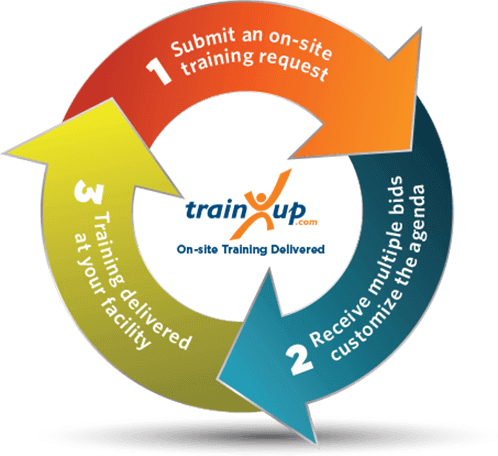
Leadership Development Training Your Way
Or Choose From 29 Business Skills Sub-Categories
- Accounting Training
- Administration Training
- Advertising Training
- Business Analysis Training
- Business Coaching Training
- Business Intelligence Training
- Business Writing Training
- Communication Training
- Conflict Management Training
- Contract Management Training
- Customer Service Training
- Entrepreneurship Training
- ISO Standards Training
- Leadership Development Training
- Management Training
- Managing Remote Teams Training
- Marketing Training
- Microsoft Office Training
- Organizational Development - OD Training
- Personal Development Training
- Presentation Skills Training
- Project Management - PMP Training
- Sales Training
- Six Sigma Training
- Social Media Training
- Supervisor Training
- Team Building Training
- Time Management Training
- Women In Leadership Training
Leadership Development Training, Leadership, Leaders Courses and Seminars
TrainUp.com is your one-stop source for the best virtual leadership development training and live courses nationwide. Start your search now and browse among 66 live instructor-led leadership development training classes near you, from the industry's best leadership development training companies such as SkillSoft, BizLibrary, and American Management Association International TrainUp.com also lists more than 484 self-paced online leadership development training courses, micro-learning videos, and eLearning bundles. If you have a team to train, we can conduct a course just for you. Check out our onsite on-site leadership development training page to request a custom virtual or in-person training quote today.
Request Leadership Development On-Site Training. We bring the best instructors to you.
TrainUp.com is your one-stop source for the best virtual leadership development training and live courses nationwide. Start your search now and browse among 66 live instructor-led leadership development training classes near you, from the industry's best leadership development training companies such as SkillSoft, BizLibrary, and American Management Association International TrainUp.com also lists more than 484 self-paced online leadership development training courses, micro-learning videos, and eLearning bundles. If you have a team to train, we can conduct a course just for you. Check out our onsite on-site leadership development training page to request a custom virtual or in-person training quote today.
Live Training
(63 Classes)
Self-Paced Courses
(250 eLearning Courses)
& Video Collections
(141 Bundles)
Up to 37% off Training
Leadership Institute For First Time Managers
Leadership Institute
Management & Leadership Skills for First-Time Supervisors & Managers
Critical Thinking Problem Solving and Decision Making
Better than Balance a Rhythmic Life Part 1 by Bruce Miller
Identifying and Nurturing Future Leaders
Real Resilient Leadership leading well under pressure and stress
Everyday leadership 3 tips to leading well building trust and accomplishing more with less
Leading others through times of change
Leading Hybrid Teams
Management & Leadership for First-Time Managers
3 Steps to Exceptional Critical Thinking
Leadership Skills for Supervisors
Advanced Leadership Communication Strategies
Women's Leadership Workshop
Leadership Development for Women
AMA's Advanced Executive Leadership Program
How to Coach a Virtual Team
Analytical Thinking Problem Solving and Decision Making
Preparing for Leadership: What It Takes to Lead
Project Team Leadership: Building Commitment Through Superior Communication
AMA Business Boot Camp: Management and Leadership Essentials
Coaching for Optimal Job Performance
Collaborative Leadership Skills
The 5 Choices to Extraordinary Productivity
The Successful Leader: Introduction to Leadership
A Guide to Servant Leadership
Leadership in a Non-Profit Organization
AMA's OnDemand Leadership Training Library
Leadership Development Program powered by MIT SMR Video Collection
Principes du leadership / Leadership Essentials
How to Motivate, Influence, and Lead Your Employees
Leveraging Leadership Techniques
Inclusive Leadership Bundle
Leadership Essentials Video Collection
Improving Leadership Skills
Women & Leadership Video Collection
Leadership and Management Video Collection
Developing Leadership Skills and Influence
Leadership Networking Video Collection
Women in Leadership Video Collection
Women in Leadership Essential Skills

Get Up to 20% off Live & Online Training Courses

We’ll Conduct The Course Just For Your Team

Get Up to 20% off eLearning
SCORM /AICC compliant. Upload content to your LMS
We’ll help customize your curriculum. Send us a request today to preview our entire online training catalog

Customized eLearning Solutions
ILT /Virtual Live to eLearning MicroLearning Video Development Mobile Learning Gamified Learning Flash to HTML5 Conversion
TrainUp.com is your one-stop source for the best virtual leadership development training and live courses nationwide. Start your search now and browse among 66 live instructor-led leadership development training classes near you, from the industry's best leadership development training companies such as SkillSoft, BizLibrary, and American Management Association International TrainUp.com also lists more than 484 self-paced online leadership development training courses, micro-learning videos, and eLearning bundles. If you have a team to train, we can conduct a course just for you. Check out our onsite on-site leadership development training page to request a custom virtual or in-person training quote today.

Request Leadership Development On-Site Training. We bring the best instructors to you.
Leadership, Leaders Courses and Workshops
Every business depends on the effectiveness of leadership and managers to function. As businesses grow and become larger over time, most face the challenge expanding their workforce and also maintaining expanding their leadership. Developing leaders to continue to support the structure of the business is not an easy task and many businesses look to those with outside experience, but others prefer to utilize individuals already within the company who have adapted the business model. Leadership is taking an active role to identify and shape the workforce for leadership prospects that will meet the business needs from both internal and external candidates.
Related Leadership Development Training
- Leadership Development training in New York, NY
- Leadership Development training in Los Angeles, CA
- Leadership Development training in Chicago, IL
- Leadership Development training in Houston, TX
- Leadership Development training in Philadelphia, PA
- Leadership Development training in Phoenix, AZ
- Leadership Development training in San Antonio, TX
- Leadership Development training in San Diego, CA
- Leadership Development training in Dallas, TX
- Leadership Development training in San Jose, CA
- Leadership Development training in Indianapolis, IN
- Leadership Development training in Jacksonville, FL
- Leadership Development training in San Francisco, CA
- Leadership Development training in Columbus, OH
- Leadership Development training in Charlotte, NC
- Leadership Development training in Detroit, MI
- Leadership Development training in Seattle, WA
- Leadership Development training in Denver, CO
- Leadership Development training in Boston, MA
- Leadership Development training in Oklahoma City, OK
- Leadership Development training in Las Vegas, NV
- Leadership Development training in Kansas City, MO
- Leadership Development training in Atlanta, GA
- Leadership Development training in Toronto, ON
- Leadership Development training in Vancouver, BC
Leadership development programs grow a person’s skills and address key aspects of a leadership. These courses discuss issues and gaps such as communication, motivating others, delegation, giving feedback, and building trust, and establish ways to fill those gaps. These programs serves to enhance the attitudes of participants in order to better perform in leadership roles or positions of influence. Leadership development programs help build self-confidence and wisdom, encourage introspection, and equip participants with knowledge of best practices in leadership.
The objective of leadership training is to enhance, develop, and build solid leadership qualities. Individuals can expect to learn communication, decision making, and management techniques from leadership training courses. It may take some individuals longer to build the confidence to lead others, but training courses are geared to expand your leadership knowledge, skills, and abilities to push you forward into a leadership role. TrainUp has several Leadership Development Training courses to help you decide what leadership objectives you need to learn first.
Employers consider a number of different training options before they decide on the right training solution for its diverse workforce. There are online leadership training options available outside of the classroom, close to home, or within the workplace. TrainUp offers numerous leadership training programs at trainup.com or your training can be scheduled onsite where your employees or entire department can learn leadership development skills together. Organizations are giving employees the opportunity to benefit significantly from company-sponsored training programs through TrainUp. Leadership competencies are valuable in today’s workforce and leadership training offers a foundation for building future leadership strategies that give employees access to several training and development programs through TrainUp.com.
If you are unsure whether you have the skills to be a good leader, then take a look at TrainUp’s leadership training programs to find out how you can benefit from enhancing your leadership skills. Leaders have many distinctive skills such as strong communication, confidence, drive, and integrity, but are also known to be very motivating and inspiring to others. TrainUp.com features several different leadership training courses that can help you acquire the leadership skills you need in your career. Our Leadership Development Training Programs cover the most prominent qualities of leaders and leadership development through our instructor-led, self-paced, virtual, or e-learning courses featured on TrainUp.com.
Leadership skills can be developed and enhanced through training, but first, learning the qualities of a leader is the key. Leaders have strong communication skills, confidence, drive, and integrity in themselves and their work. Leaders are motivating and their ability to evoke change in others is inspiring. Developing your leadership skills takes time and dedication and TrainUp’s Leadership Development Training courses will give you a comprehensive look into leadership. Our e-learning, classroom, and virtual courses feature several different leadership skills that can help you become a good leader.
Leaders have many distinctive skills such as strong communication, confidence, drive, integrity, and high ethical standards. Leaders are also known to be decisive and adaptable, which can be very motivating and inspiring others. If you are ready to elevate your leadership skills, TrainUp’s Leadership Development Training courses give you a comprehensive look at leaders and leadership with instructor-led, self-paced, e-learning, or onsite training courses listed on TrainUp.com. TrainUp features several different leadership training courses that can help you distinguish what it takes to become a good leader.
Having leadership skills essentially means you have the drive to make decisions and communicate effectively in order to get the job done. Individuals may struggle with prioritizing, being decisive, or building solid relationships with cohorts in the workplace, which indicates a lack of leadership skills. Leadership skills can be improved. To improve your professional performance, individuals can take leadership courses to learn how to communicate, make decisions, and manage responsibilities. Training courses are geared to expand your leadership knowledge, skills, and abilities to prepare you for a leadership role. TrainUp features leadership training courses to expand your leadership knowledge and improve your professional performance.
Organizations that have great leaders on their team means that they have facilitators who can drive decision making, communicate effectively, and motivate others to get the job done. Individuals who struggle with prioritizing, being decisive, or building solid relationships may lack the leadership skills that organizations need. Organizations are helping individuals improve their performance by allowing individuals to take leadership development courses. Ultimately, leadership training courses are geared to expand your leadership knowledge, skills, and abilities. TrainUp features leadership training courses to expand your leadership knowledge and prepare you to step into a leadership role in the future.
One of the biggest lessons individuals learn from leadership courses is confidence. By learning the concepts and techniques of leaders, individuals learn how to apply more value to performing at a higher level. Leadership training allows individuals to understand their strengths and passions, and how to capitalize on their strengths with confidence. The leadership training options featured on Trainup.com helps individuals find the right training, whether you prefer online, instructor-led, or virtual classrooms, imagine your future as a confident leader.
If you are unsure whether you have the skills to be a good leader, take a look around your workplace to see who inspires you, and what the best qualities those leaders have that you find admirable. Leaders have many distinctive attributes such as strong communication, confidence, drive, integrity, and high ethical standards. Leaders are also known to be decisive, adaptable, and motivated to lead and inspire others. TrainUp features several different leadership training courses that can help you distinguish what it takes to become a good leader. If you are ready to elevate your leadership skills, TrainUp’s Leadership Development Training courses cover these most prominent qualities of leaders through our instructor-led, self-paced, or short e-learning courses featured on trainup.com.
Leadership development is designed to build leadership skills, but stepping into a leadership role is not easy for everyone. Individuals may struggle with prioritizing, being decisive, or building solid relationships to confidently lead in the workplace. Thankfully, leadership skills can be developed and improved. Leadership development is important to employers because it helps to improve professional performance. Individuals can take leadership development courses to learn how to communicate, make decisions, and manage responsibilities effectively. Training teaches individuals how to apply leadership qualities towards performing at a higher level. TrainUp’s leadership development training courses will allow individuals to understand their strengths and passions, and how to capitalize on their strengths on the job.
Leaders have many distinctive skills such as strong communication, confidence, drive, integrity, and high ethical standards. Leaders are known to be decisive, adaptable, and are also highly motivated to lead and inspire others. If you are ready to elevate your leadership skills, TrainUp’s Leadership Development Training courses cover several areas of leadership through instructor-led, self-paced, or short e-learning courses. Our “Project Team Leadership,” “Discovering Your Leadership Voice,” and “Leadership and Influence” training courses are just examples of the courses available to you on trainup.com. Leadership Development Programs can also be designed through our onsite training, an impactful learning environment designed for a group, team, or staff to all acquire the same learning material and skills at the same time.
Join The 50,000+ Companies That Have Purchased Training from TrainUp.com
-
50K+ Companies Trained
Including 90% Of Fortune 500 Companies Have Purchased Training With TrainUp.com
-
300K+ Courses & Videos
Live Instructor-Led (Classroom & Virtual), Self-Paced E-learning & Custom OnSite Training Solutions From Leading Training Providers
-
800+ Expert Instructors
Industry-Leading Subject Matter Experts (SMEs).Tenured &
Award-Winning Instructor Network
Get the latest industry news, recommended courses, & promotions from TrainUp.com sent straight to your inbox.











